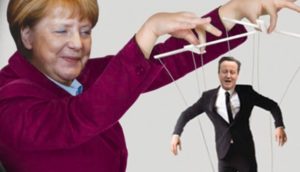When Germany asserts its power, historical reflexes trigger fear.
In nationalist terms, fear of Germany is a reflex born through two world wars. But, an emerging trend in German-sceptic rhetoric comes from “the centre,” that is, the establishment.
The argument that the EU is a mechanism rigged in the service of Germany is becoming too potent to ignore.
And the argument that Germany must assume the cost of Europeanization is also potent. In the words of the former Polish foreign minister Sikorski in 2011: “I will probably be the first Polish foreign minister in history to say so, but here it is: I fear German power less than I am beginning to fear German inactivity.”
left
Initially, this a point made by the left fringe in Portugal, Greece, Spain, and Ireland, which are not fringe any more. “It’s true that adversaries fight and the fundamental project of Germany and many sectors of the European oligarchy was to defeat Tsipras and defeat his government,” Pablo Iglesias commented in December 2015 in an interview with the Guardian. Tsipras himself has been ridiculed for playing the anti-German card, only to swallow his bravado later down the line. But, Europe’s left has often evoked an “us versus them” rhetoric, in which “them” is often Germany or even Chancellor Merkel. For some time, this was politically beneficial for the Chancellor.
right
A more recent phenomenon is the anti-German card played by the Visegrad 4 governments. “Today, the tone from Germany is gruff, rude and aggressive,” Victor Orban told the Bild Tabloid in February. He blasted Germany and Angela Merkel’s liberal refugee policy for undermining Europe’s “ethnic, cultural, and religious point of view.” Largely, this anti-liberal attack has been politically detrimental, for Germany and the Chancellor.
Recently the Leave campaign in Britain has started playing the anti-German card, presenting the EU as a “rigged game” in which Germany always wins, an allusion to football to England’s bad football experiences. On Tuesday, the Sun features David Cameron being “played” like a puppet from Angela Merkel, in a caricature that is certainly not the worst she has experienced over the last few years.
Meanwhile, the former cabinet minister of the Conservatives, Duncan Smith, rather unconvincingly argues that Germany opposed Cameron’s “welfare break;” the truth, of course, is that Germany has passed identical legislation to prevent what Cameron coined as “welfare tourism.” So much for taking on the “Krauts.” Still, many will heed such rhetoric, in the U.K at least.
center
Underneath it all is a fundamental financial argument. Martin Wolf, of the Financial Times commented on Wednesday that “the monetary union will fail if it is run for the benefit of creditors alone,” which as sharp an anti-German criticism as one can get from Europe’s financial establishment.
Wolf remark’s on Wolfgang Schäuble’s recently discovered political sensitivity when he accused the European Central Bank of being responsible for the surge of the far-right Alternative for Germany, an anti-euro party.
Schäuble’s argument is all too familiar: zero interest rates are very bad for insurance companies, pension funds, savings banks, and above all pensioners, many of whom happen to be good old conservative voters, suddenly becoming more conservative.
The paradox of trying to run Europe on the principles of postwar ordoliberalism – balanced budget at all times, price stability or even deflation, and price flexibility – and asking the ECB to adjust to your electoral calendar is not raised by the FT analyst. But, it is too apparent to ignore.
Wolf merely says that the ECB is “rightly trying to prevent a spiral into deflation.” In other words, if Germany is the Eurozone’s engine, it is not pulling any wagons at all. And so Draghi needs to do all the work. Demand has risen by 4% since 2013 and inflation has stabilized to 1%. “This is not a failure; it isa a success,” Wolf argues. His conclusion is that Germany must either exit the eurozone or allow the ECB to work for the system as a whole.
In other words…
Europe cannot heed German national interests at all times.
Going back to the statement of foreign minister Sikorski, perhaps the truth is that the project of European Integration was very much inspired by the need to remold German dynamism into a broader framework that would make it less threatening. Failing that, the discourse of hegemony rules, and Europe fails.




